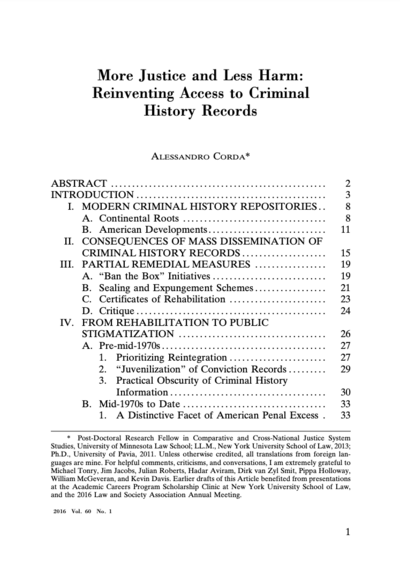More Justice and Less Harm: Reinventing Access to Criminal History Records
Journal Article
Clean Slate
Topics:
Collateral Consequences
Criminal and Juvenile Records
Records Clearance, Expungement, and Sealing
Reentry population:
Adults
Date:
Source:
Howard Law Journal
More Justice and Less Harm: Reinventing Access to Criminal History Records
This Article, from the Howard Law Journal, challenges the conventional wisdom that public access and dissemination of criminal history information raise no special problems once a conviction occurs. The label “offender” burdens convicted individuals long after their debt to society has been paid. Numerous damaging effects labeled as mere “informal” collateral consequences of conviction go largely unquestioned.
The Article contends that the current state of affairs is an unintended consequence of post-Watergate open records movement and emphasis on public safety in criminal justice policy, compounded by the development of information technology and the Internet, and emergence of a private industry that trawls, sells, and often sensationalizes criminal records. Such industry has made access to criminal history information easy, cheap, ubiquitous, and unlimited in time.
The Article argues for a reimagining of the way the criminal justice system and the legal system as a whole classify and use records of criminal convictions. In particular, it contends that the stigma that public access and dissemination entail must be reinvented as an ancillary criminal sanction that is ordered at sentencing, if at all, for a limited time as a deserved supplement to criminal sanctions imposed.




